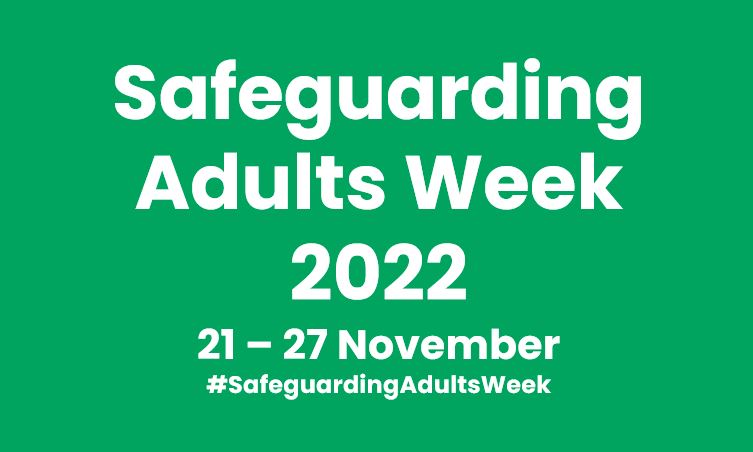
Safeguarding Adults Week 2022 will take place from Monday 21- Sunday 27 November.
It’s an opportunity for organisations to come together to raise awareness of important safeguarding issues. The aim is to highlight key safeguarding key issues, start conversations and raise awareness of safeguarding best practice. So we can all be better together.
Each day we’ll be focusing on a different safeguarding theme to explore how we can respond to contemporary safeguarding challenges.
We’ll be releasing information about seminars, resources, guidance and social media assets in the months leading up to the week. So bookmark this page to stay informed! You can also sign up to receive email updates here.
Responding to Contemporary Safeguarding Challenges
From our work with organisations and practitioners, we are becoming increasingly aware of many new potential sources of harm. As safeguarding advocates it is important that we stay aware of how changing circumstances might impact people’s experiences and their risk of harm and abuse.
Safeguarding Adults Week is a time for practitioners and organisations to develop their safeguarding knowledge. We hope the themes for 2022 will raise awareness of new forms of abuse and different ways of recognising and responding to safeguarding concerns in contemporary society.
Monday: Exploitation and County Lines
Research indicates that lockdown has increased the number of people at risk of exploitation. This is largely due to economic concerns and increased isolation.
We will be using this day to raise awareness about how adults could be exploited through county lines activity. Learn how to spot the signs that someone is at risk of exploitation, and how to respond effectively.
Tuesday: Self-Neglect
The term “self-neglect” covers a wide range of behaviour neglecting to care for one’s personal hygiene, health or surroundings.
We’ve seen a rise in self-neglect cases over the last two years, particularly for older people.
On this day you can explore how you can spot the signs someone is at risk of self-neglect. We’ll also provide practical guidance about how to start difficult conversations and respond to those at risk, while maintaining autonomy.
Wednesday: Creating Safer Organisational Cultures
Promoting safer cultures is all about how organisations and individuals can take steps to minimise harm occurring in the first instance. It’s also about embedding appropriate policies and procedures. In this way, people will know what to do if they have a concern to report. In addition, the organisation will have a plan in place for acting on concerns.
On this day we’ll focus on how to create open and safe cultures in organisations.
We’ll explore how to start difficult conversations about safeguarding adults. We will also explore how organisations and individuals can develop cultural competencies to respectfully respond to the needs of the diverse populations they are supporting.
Thursday: Elder Abuse
Elder abuse is a single or repeated act, or lack of appropriate action, occurring within any relationship where there is an expectation of trust, which causes harm or distress to an older person.
The World Health Organisation has found that rates of elder abuse have increased since the pandemic. Around one in six people aged 60 years and older experience some form of abuse in a community setting. Also, rates of elder abuse are high in institutions such as nursing homes and long-term care facilities. Two thirds of staff report that they have committed abuse in the past year.
We will be using this day to raise awareness of elder abuse in community and residential settings.
Friday: Domestic Abuse in Tech-Society
Technology can help to keep people safe. But abusers can also use technology to cause harm.
This day marks the start of 16 Days of Action for Violence Against Women and Girls. So to support this campaign, we are raising awareness of the role technology has in exacerbating instances of domestic abuse.
We will be exploring how you can spot the signs someone is at risk through technology. We’ll also explore how people can minimise the extent to which technology can be used against them in abuse cases. Refuge has published resources to support people at risk of tech-abuse.
Saturday and Sunday: Safeguarding in Everyday Life
We often explore the importance of safeguarding in relation to organisations and workplaces. Yet safeguarding is just as important in our communities and everyday life.
Many people are continuing to work from home and spending an increasing amount of time in their local area. So we want to raise awareness about the importance of safeguarding in the community.
On this day we will be focusing on bystander action. We’ll explore the actions you can take if you witness incidents of discrimination or bullying in everyday life. We will also be sharing resources on how to tackle loneliness and isolation in communities.
Remember to sign up for Safeguarding Adults Week email updates here.
